新目标七年级英语语法
- 格式:doc
- 大小:51.51 KB
- 文档页数:11
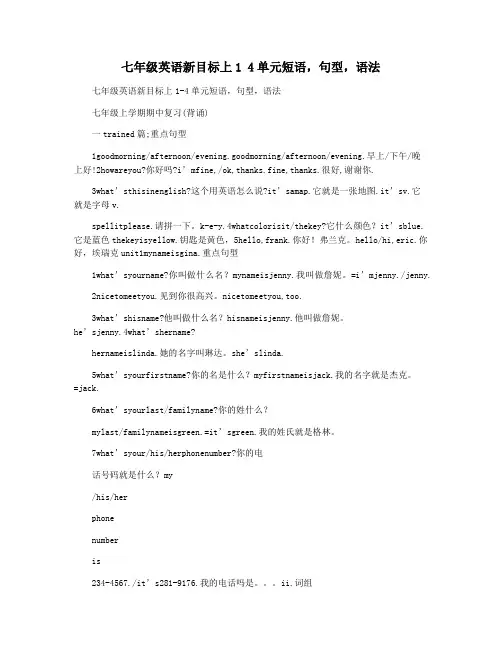
七年级英语新目标上1 4单元短语,句型,语法七年级英语新目标上1-4单元短语,句型,语法七年级上学期期中复习(背诵)一trained篇;重点句型1goodmorning/afternoon/evening.goodmorning/afternoon/evening.早上/下午/晚上好!2howareyou?你好吗?i’mfine,/ok,thanks.fine,thanks.很好,谢谢你.3what’sthisinenglish?这个用英语怎么说?it’samap.它就是一张地图.it’sv.它就是字母v.spellitplease.请拼一下。
k-e-y.4whatcolorisit/thekey?它什么颜色?it’sblue.它是蓝色thekeyisyellow.钥匙是黄色,5hello,frank.你好!弗兰克。
hello/hi,eric.你好,埃瑞克unit1mynameisgina.重点句型1what’syourname?你叫做什么名?mynameisjenny.我叫做詹妮。
=i’mjenny./jenny.2nicetomeetyou.见到你很高兴。
nicetomeetyou,too.3what’shisname?他叫做什么名?hisnameisjenny.他叫做詹妮。
he’sjenny.4what’shername?hernameislinda.她的名字叫琳达。
she’slinda.5what’syourfirstname?你的名是什么?myfirstnameisjack.我的名字就是杰克。
=jack.6what’syourlast/familyname?你的姓什么?mylast/familynameisgreen.=it’sgreen.我的姓氏就是格林。
7what’syour/his/herphonenumber?你的电话号码就是什么?my/his/herphonenumberis234-4567./it’s281-9176.我的电话吗是。
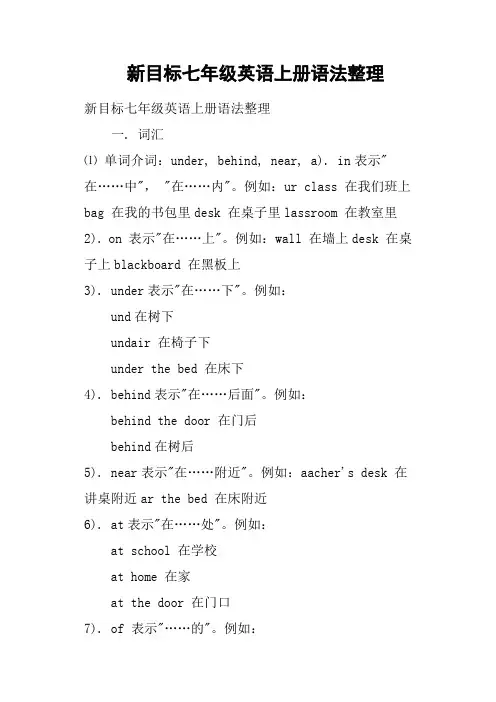
新目标七年级英语上册语法整理新目标七年级英语上册语法整理一. 词汇⑴ 单词介词:under, behind, near, a). in表示"在……中", "在……内"。
例如:ur class 在我们班上bag 在我的书包里desk 在桌子里lassroom 在教室里2). on 表示"在……上"。
例如:wall 在墙上desk 在桌子上blackboard 在黑板上3). under表示"在……下"。
例如:und在树下undair 在椅子下under the bed 在床下4). behind表示"在……后面"。
例如:behind the door 在门后behind在树后5). near表示"在……附近"。
例如:aacher's desk 在讲桌附近ar the bed 在床附近6). at表示"在……处"。
例如:at school 在学校at home 在家at the door 在门口7). of 表示"……的"。
例如:a picture of our classroom 我们教室的一幅画a maa 一张中国地图2. 冠词 a / an / the:冠词一般位于所限定的名词前,用来署名名词所指的人或事物。
冠词有不定冠词和定冠词两种。
不定冠词有两个形式,即a和an。
a用在以辅音音素开头的词前,如a book; an用在以元音音素开头的字母前,如an appla或an与可数名词单数连用,泛指某类人或某物中的一个。
This is a ca这是一只猫。
It's an English b这是一本英语书。
His faa w他的爸爸是个工人。
the既可以用在可数名词前,也可以用在不可数名词前,表示某个或某些特定的人或事物,也可以指上文提到过的人或事物。
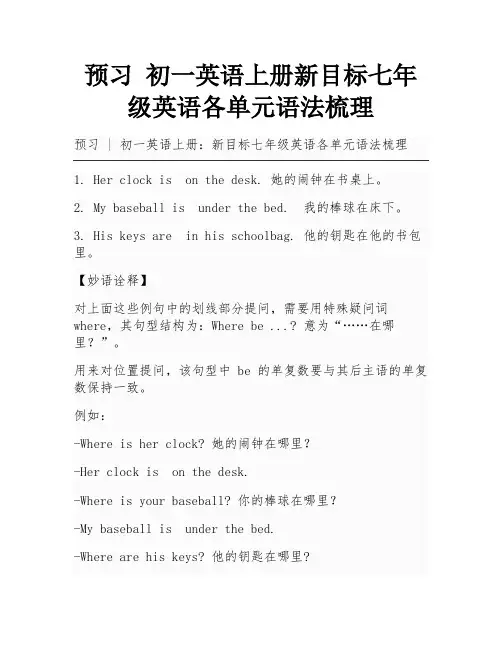
预习初一英语上册新目标七年级英语各单元语法梳理
1. Her clock is on the desk. 她的闹钟在书桌上。
2. My baseball is under the bed. 我的棒球在床下。
3. His keys are in his schoolbag. 他的钥匙在他的书包里。
【妙语诠释】
对上面这些例句中的划线部分提问,需要用特殊疑问词where,其句型结构为:Where be ...? 意为“……在哪里?”。
用来对位置提问,该句型中 be 的单复数要与其后主语的单复数保持一致。
例如:
-Where is her clock? 她的闹钟在哪里?
-Her clock is on the desk.
-Where is your baseball? 你的棒球在哪里?
-My baseball is under the bed.
-Where are his keys? 他的钥匙在哪里?
-His keys are in his schoolbag.。
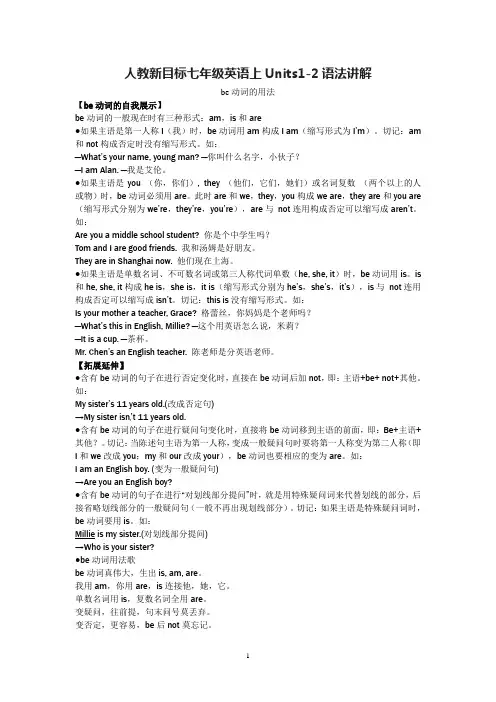
人教新目标七年级英语上Units1-2语法讲解be动词的用法【be动词的自我展示】be动词的一般现在时有三种形式:am,is和are●如果主语是第一人称I(我)时,be动词用am构成I am(缩写形式为I’m)。
切记:am 和not构成否定时没有缩写形式。
如:—What’s your name, young man? —你叫什么名字,小伙子?—I am Alan. —我是艾伦。
●如果主语是you (你,你们), they (他们,它们,她们)或名词复数(两个以上的人或物)时,be动词必须用are。
此时are和we,they,you构成we are,they are和you are (缩写形式分别为we’re,they’re,you’re),are与not连用构成否定可以缩写成aren’t。
如:Are you a middle school student? 你是个中学生吗?Tom and I are good friends. 我和汤姆是好朋友。
They are in Shanghai now. 他们现在上海。
●如果主语是单数名词、不可数名词或第三人称代词单数(he, she, it)时,be动词用is。
is 和he, she, it构成he is,she is,it is(缩写形式分别为he’s,she’s,it’s),is与not连用构成否定可以缩写成isn’t。
切记:this is没有缩写形式。
如:Is your mother a teacher, Grace? 格蕾丝,你妈妈是个老师吗?—What’s this in English, Millie? —这个用英语怎么说,米莉?—It is a cup. —茶杯。
Mr. Chen’s an English teacher.陈老师是分英语老师。
【拓展延伸】●含有be动词的句子在进行否定变化时,直接在be动词后加not,即:主语+be+ not+其他。

频度副词usually, sometimes, always, often等词在英文中被称为“频度副词”,是用来表示动作频率的,但程度上有别。
一般来说可按频率大小排列:always>usually>often>sometimes>seldom(很少)>hardly ever>never(从不)频度副词的位置1. 在be动词之后。
如:She is sometimes very busy. 她有时很忙。
2. 在第一个助动词或情态动词之后。
如:I will never forget the first time I met you. 我将永远忘不了和你的第一次见面。
3. 在实义动词之前。
如:We often go there. 我们常去那儿。
4. sometimes也可放在句首、句中或句末,often也可放在句末。
如:Sometimes she writes to me. 她有时候给我写信。
She writes to me often. 她经常给我写信。
注:如果有两个助动词,频度副词通常放在第一个助动词后面。
We have never been invited to one of their parties. 他们聚会,一次也没邀请过我们。
She must sometimes have wanted to run away. 她有时候一定想到过要逃走。
用法1. often, always, usually等通常和一般现在时连用,表示现在经常或反复发生的动作。
如:It often rains here in April. 这儿四月份常下雨。
2. always与进行时连用时,并不强调动作正在进行,而是表示赞叹、厌烦等情绪。
如:He is always thinking of others. 他总是想着别人。
(赞叹)She is always asking silly questions. 她老是问些愚蠢的问题。
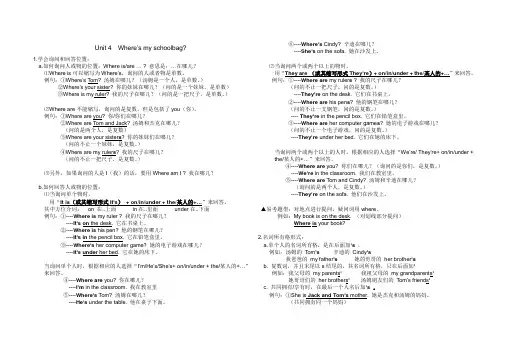
Unit 4 Where’s my schoolbag?1.学会询问和回答位置:a.如何询问人或物的位置:Where is/are … ? 意思是:…在哪儿?⑴Where is可以缩写为Where’s,询问的人或者物是单数。
例句:①Where’s T om? 汤姆在哪儿?(汤姆是一个人,是单数。
)②Where’s your sister? 你的妹妹在哪儿?(问的是一个妹妹,是单数)③Where is my ruler? 我的尺子在哪儿?(问的是一把尺子,是单数。
)⑵Where are不能缩写,询问的是复数,但是包括了you(你)。
例句:①Where are you? 你/你们在哪儿?②Where are T om and Jack? 汤姆和杰克在哪儿?(问的是两个人,是复数)③Where are your sister s? 你的妹妹们在哪儿?(问的不止一个妹妹,是复数。
)④Where are my ruler s? 我的尺子在哪儿?(问的不止一把尺子,是复数。
)⑶另外,如果询问的人是I(我)的话,要用Where am I ? 我在哪儿?b.如何回答人或物的位置:⑴当询问单个物时,用“It is(或其缩写形式It’s)+ on/in/under + the/某人的+…”来回答。
其中方位介词:on 在..上面in在..里面under在..下面例句:①----Where is my ruler ? 我的尺子在哪儿?----It’s on the desk. 它在书桌上。
②----Where is his pen? 他的钢笔在哪儿?----It’s in the pencil box. 它在铅笔盒里。
③----Where’s her computer game? 她的电子游戏在哪儿?----It’s under her bed. 它在她的床下。
当询问单个人时,根据相应的人选择“I’m/He’s/She’s+ on/in/under + the/某人的+…”来回答。
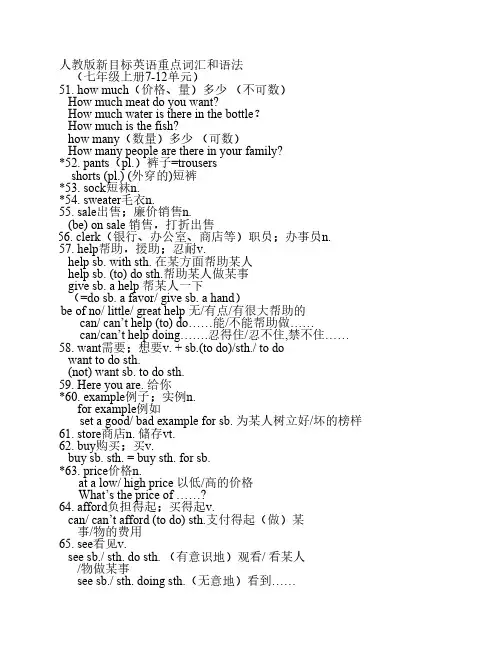
人教版新目标英语重点词汇和语法(七年级上册7-12单元)51. how much(价格、量)多少(不可数)How much meat do you want?How much water is there in the bottle?How much is the fish?how many(数量)多少(可数)How many people are there in your family?*52. pants(pl.)裤子=trousersshorts (pl.) (外穿的)短裤*53. sock短袜n.*54. sweater毛衣n.55. sale出售;廉价销售n.(be) on sale 销售,打折出售*56. clerk(银行、办公室、商店等)职员;办事员n.57. help帮助,援助;忍耐v.help sb. with sth. 在某方面帮助某人help sb. (to) do sth.帮助某人做某事give sb. a help 帮某人一下(=do sb. a favor/ give sb. a hand)be of no/ little/ great help 无/有点/有很大帮助的can/ can’t help (to) do……能/不能帮助做……can/can’t help doing…….忍得住/忍不住,禁不住……58. want需要;想要v. + sb.(to do)/sth./ to dowant to do sth.(not) want sb. to do sth.59. Here you are. 给你*60. example例子;实例n.for example例如set a good/ bad example for sb. 为某人树立好/坏的榜样61. store商店n. 储存vt.62. buy购买;买v.buy sb. sth. = buy sth. for sb.*63. price价格n.at a low/ high price 以低/高的价格What’s the price of ……?64. afford负担得起;买得起v.can/ can’t afford (to do) sth.支付得起(做)某事/物的费用65. see看见v.see sb./ sth. do sth. (有意识地)观看/ 看某人/物做某事see sb./ sth. doing sth.(无意地)看到……66. yourself你自己(反身代词)pron.67. sell销售;卖v.sell sth. (to sb.)68. from从;从……起prep.69. have/ take a look (at)看一看;看一眼70. sorry抱歉的;遗憾的;难过的adj.feel sorry for sb. 替某人感到惋惜/难过feel sorry about (doing) sth. 因做某事而感到歉疚say sorry to sb.对某人表示歉意be sorry to do sth. 对做某事而感到遗憾/难过/歉疚be sorry + that从句:抱歉……Unit 871. when(疑问副词)什么时候;何时adv.*72. January一月;正月n.*73. February 二月n.*74. March三月n.*75. April四月n.*76. August八月n.*77. September九月n.*78. October 十月n.*79. November 十一月n.*80. December 十二月n.81. second 第二num.82. third 第三num.83. fifth 第五num.84. ninth num.第九*85. twelfth num.第十二86. twentieth num.第二十87. thirtieth num.第三十*88. date n.日期What’s the date today? 今天几号?date back to… 追溯到……These old building dates back to Qin dynasty.这座古建筑可以追溯到秦朝。
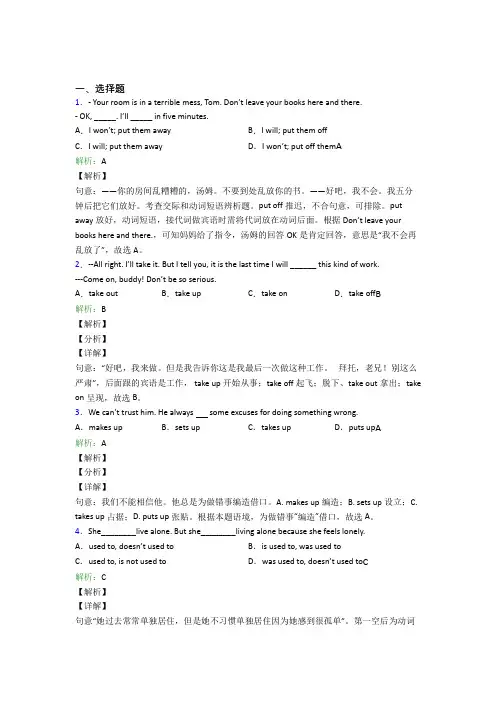
一、选择题1.- Your room is in a terrible mess, Tom. Don’t leave your books here and there.- OK, _____. I’ll _____ in five minutes.A.I won’t; put them away B.I will; put them offC.I will; put them away D.I won’t; put off them A解析:A【解析】句意:——你的房间乱糟糟的,汤姆。
不要到处乱放你的书。
——好吧,我不会。
我五分钟后把它们放好。
考查交际和动词短语辨析题。
put off推迟,不合句意,可排除。
put away放好,动词短语,接代词做宾语时需将代词放在动词后面。
根据Don’t leave your books here and there.,可知妈妈给了指令,汤姆的回答OK是肯定回答,意思是“我不会再乱放了”,故选A。
2.--All right. I’ll take it. But I tell you, it is the last ti me I will ______ this kind of work.---Come on, buddy! Don’t be so serious.A.take out B.take up C.take on D.take off B解析:B【解析】【分析】【详解】句意:“好吧,我来做。
但是我告诉你这是我最后一次做这种工作。
拜托,老兄!别这么严肃”,后面跟的宾语是工作, take up开始从事;take off起飞;脱下、take out拿出;take on呈现,故选B。
3.We can’t trust him. He always some excuses for doing something wrong.A.makes up B.sets up C.takes up D.puts up A解析:A【解析】【分析】【详解】句意:我们不能相信他。
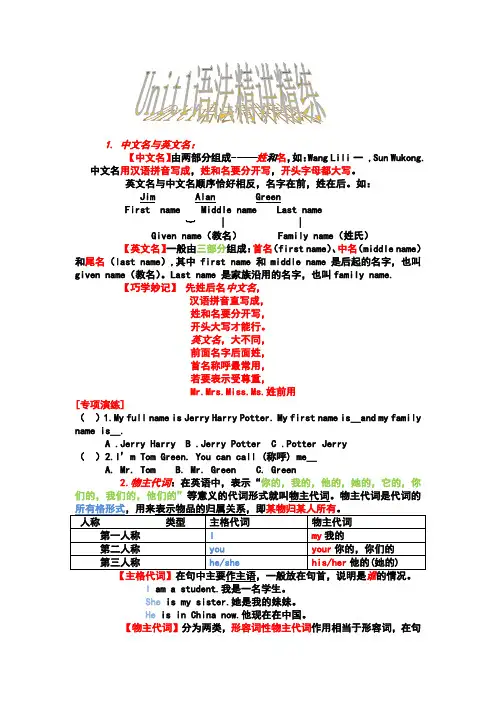
1. 中文名与英文名:【中文名】由两部分组成-----姓和名,如:Wang Lili一 ,Sun Wukong.中文名用汉语拼音写成,姓和名要分开写,开头字母都大写。
英文名与中文名顺序恰好相反,名字在前,姓在后。
如:Jim Alan GreenFirst name Middle name Last name︸ | |Given name(教名)Family name(姓氏)【英文名】一般由三部分组成:首名(first name)、中名(middle name)和尾名(last name),其中first name 和middle name是后起的名字,也叫given name(教名)。
Last name 是家族沿用的名字,也叫family name.【巧学妙记】先姓后名中文名,汉语拼音直写成,姓和名要分开写,开头大写才能行。
英文名,大不同,前面名字后面姓,首名称呼最常用,若要表示受尊重,Mr.Mrs.Miss.Ms.姓前用[专项演练]()1.My full name is Jerry Harry Potter. My first name is_and my family name is_.A .Jerry HarryB .Jerry PotterC .Potter Jerry()2.I’m Tom Green. You can call (称呼) me_A. Mr. TomB. Mr. GreenC. Green2.物主代词:在英语中,表示“你的,我的,他的,她的,它的,你们的,我们的,他们的”等意义的代词形式就叫物主代词。
物主代词是代词的在句中主要作主语,一般放在句首,说明是I am a student.我是一名学生。
She is my sister.她是我的妹妹。
He is in China now.他现在在中国。
【物主代词】分为两类,形容词性物主代词作用相当于形容词,在句中用于修饰名词,如my name ,your phone number ,his ruler ,her schoolbag.【巧学妙记】主格代词作主语,放在句首说明谁,I, we ,you ,he ,she ,it ,they,一共七个来打擂。
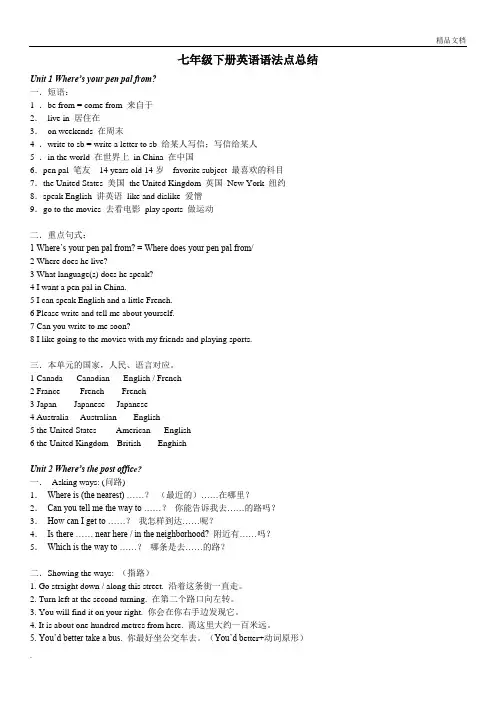
七年级下册英语语法点总结Unit 1 Where’s your pen pal from?一.短语:1 .be from = come from 来自于----2.live in 居住在---3.on weekends 在周末4 .write to sb = write a letter to sb 给某人写信;写信给某人5 .in the world 在世界上in China 在中国6.pen pal 笔友14 years old 14岁favorite subject 最喜欢的科目7.the United States 美国the United Kingdom 英国New York 纽约8.speak English 讲英语like and dislike 爱憎9.go to the movies 去看电影play sports 做运动二.重点句式:1 Where’s your pen pal from? = Where does your pen pal from/2 Where does he live?3 What language(s) does he speak?4 I want a pen pal in China.5 I can speak English and a little French.6 Please write and tell me about yourself.7 Can you write to me soon?8 I like going to the movies with my friends and playing sports.三.本单元的国家,人民、语言对应。
1 Canada---- Canadian---- English / French2 France------ French------French3 Japan------Japanese----Japanese4 Australia----Australian----- English5 the United States------ American---- English6 the United Kingdom---British----- EnghishUnit 2 Where’s the post offic e?一.Asking ways: (问路)1.Where is (the nearest) ……?(最近的)……在哪里?2.Can you tell me the way to ……?你能告诉我去……的路吗?3.How can I get to ……?我怎样到达……呢?4.Is there …… near here / in the neighborhood? 附近有……吗?5.Which is the way to ……?哪条是去……的路?二.Showing the ways: (指路)1. Go straight down / along this street. 沿着这条街一直走。
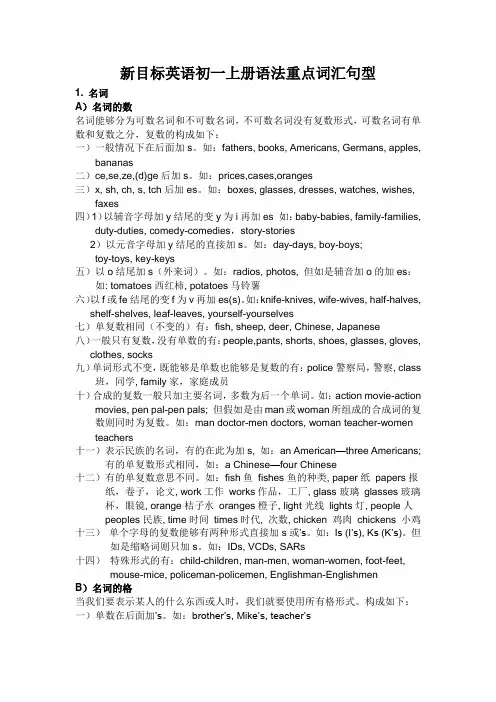
新目标英语初一上册语法重点词汇句型1. 名词A)名词的数名词能够分为可数名词和不可数名词,不可数名词没有复数形式,可数名词有单数和复数之分,复数的构成如下:一)一般情况下在后面加s。
如:fathers, books, Americans, Germans, apples, bananas二)ce,se,ze,(d)ge后加s。
如:prices,cases,oranges三)x, sh, ch, s, tch后加es。
如:boxes, glasses, dresses, watches, wishes, faxes四)1)以辅音字母加y结尾的变y为i再加es 如:baby-babies, family-families, duty-duties, comedy-comedies,story-stories2)以元音字母加y结尾的直接加s。
如:day-days, boy-boys;toy-toys, key-keys五)以o结尾加s(外来词)。
如:radios, photos, 但如是辅音加o的加es:如: tomatoes西红柿, potatoes马铃薯六)以f或fe结尾的变f为v再加es(s)。
如:knife-knives, wife-wives, half-halves, shelf-shelves, leaf-leaves, yourself-yourselves七)单复数相同(不变的)有:fish, sheep, deer, Chinese, Japanese八)一般只有复数,没有单数的有:people,pants, shorts, shoes, glasses, gloves, clothes, socks九)单词形式不变,既能够是单数也能够是复数的有:police警察局,警察, class 班,同学, family家,家庭成员十)合成的复数一般只加主要名词,多数为后一个单词。
如:action movie-action movies, pen pal-pen pals; 但假如是由man或woman所组成的合成词的复数则同时为复数。
(七年上册1-6元)初中英重点、法知* (1)注: * 的的Unit 11.meet v. 遇,迎接 +sb.2.question n.;;; 疑3.answer n.答;答复;答案answer questions/ a questionanswer one’ s letter回信4. look v.看;望;看起来look at看⋯⋯look after照,照看,保留look for找look up抬看;;改进,好look like看起来像look over仔;look around四看look out小心,小心look intolook down on/ upon小看;看不起look through翻look back回5. last adj.最后的;上一个的at last最,最后in the last few days/ weeks⋯在最后的几天/ 星期last night/ week/ month/ year/ century⋯*6. zero num.零7. family n.家;家庭成集体名。
指“家庭” ,相当于数,指“家人” ,相当于复数。
例:The family is a happy one.是一个幸福的家庭。
The family are having supper now.一家子在吃晚。
似的名有:class, grade, group, team, party, etc.Unit 2*8. pencil sharpener卷笔刀;笔刀9.that 那;那个 pron.& adj.10.watch 手表 n. 看 vt.watch sb. doing sth.察某人在做某事watch TV 看*11. a set of一套⋯⋯;一副⋯⋯Unit 312. these些pron.& adj.(this的复数)13. those那些pron.& adj.(that的复数)14. thanks for (doing) sth.⋯⋯而感15.for (表示原因或目的)了 prep. Unit 416.where 哪里 adv*17. dresser梳台n.*18. drawer抽n.*19. plant植物n.20.under 在⋯下面;低于;被⋯中 prep. under0 °低于氏 0°under the tree/ table在/桌下under control/ construction/ attack被控制/建/攻中21.on 在⋯上面 ( 表面相接触 ) ;在某日期;有关⋯ prep.on the table, on May 4th,on Sunday evening,a speech on pollution有关染的演*22. alarm clock23. bring拿来;取来;来v.反: take 走;拿走,取走24.some 一些 ; 若干 pron.& adj. 用于必定句、表示宛转气的句中any 一些,任何的pron. & adj.用于否定句和疑句中;用于必定句,意“任何的”25.need 需要 v.need sth.need to do⋯...not need to do⋯⋯needn’t do⋯⋯need + sb. + do⋯⋯*26. floor地板;地面n.Unit 526.have 有;吃;;行;使得⋯⋯ v.have/make sb. do sth.使某人做某事have sth. done某事被做27.does (do 的第三人称数 ) 做;干;构成否定句、疑句的助v.& aux.28. doesn't = does notdoes(主第三人称数)和do(主I,you 和复数)做助,后接原形,用于构成一般在中行和系(be 除外)的否定句和疑句构;也可以表示及构成否定意的祈使句。
七年级上册英语语法1.动词be(is,am,are)的用法我(I)用am, 你(you)用are,is跟着他(he),她(she),它(it)。
单数名词用is,复数名词全用are。
变否定,更容易,be后not加上去。
变疑问,往前提,句末问号莫丢弃。
还有一条须注意,句首大写莫忘记。
2.this,that和it用法(1)this和that是指示代词,it是人称代词。
(2)距离说话人近的人或物用this, 距离说话人远的人或物用that。
如:This is a flower. 这是一朵花。
(近处)That is a tree. 那是一棵树。
(远处)(3)放在一起的两样东西,先说this, 后说that。
如:This is a pen. That is a pencil. 这是一支钢笔。
那是一支铅笔。
(4)向别人介绍某人时说This is…, 不说That is…。
如:This is Helen. Helen, this is Tom. 这是海伦,海伦,这是汤姆。
(5)This is 不能缩写, 而That is可以缩写。
如:This is a bike. That’s a car. 这是一辆自行车。
那是一辆轿车。
(6)打电话时,介绍自己用this, 询问对方用that。
如:—Hello! Is that Miss Green? 喂,是格林小姐吗?—Yes, this is. Who’s that? 是的,我是,你是谁?注意:虽然汉语中使用“我”和“你”,但英语中打电话时绝不可以说:I am…, Are you…?/Who are you?(7)在回答this或that作主语的疑问句时, 要用it代替this或that。
如:①—Is this a notebook? 这是笔记本吗?—Yes, it is. 是的,它是。
②—What’s that? 那是什么?—It’s a kite. 是只风筝。
3.these和those用法this, that, these和those是指示代词,these是this的复数形式,指时间,距离较近的或下面要提到的人或事;those是that的复数形式,指时间、距离较远或前面已经提到过的人或事物。
一、选择题1.The flower is very beautiful, it smells pleasant.A.and B.but C.so D.or A解析:A【解析】句意:那朵花非常漂亮,而且它闻起来令人愉快。
and而且,but但是,so所以,or或者。
前一句称赞这朵花漂亮,后一句说这朵花好闻,前后表示递进关系,故用连词and,故选A。
2.Simon 12, Martin isn't. Martin is 13.A.is; and B.are; and C.is; but D.are; but C解析:C【解析】【分析】【详解】句意:Simon12岁了,但是Martin不是,Martin13岁了。
is是,用于主语是单数的时候;are用于主语是复数的时候;and和,而且,表示承接关系;but但是,表示转折关系。
第一句话的主语是Simon,be动词应用is,故先排除B和D;根据句意Simon12岁,而Martin不是12岁,故这里是转折的关系,应用but。
选C。
3.The dress fits me well, ______I don’t want to buy it because it’s too expensive.A.so B.and C.or D.but D解析:D【解析】试题分析:第一句The dress fits me well,表示衣服大小合适,按理说要买,但是后文_I don’t want to buy it because it’s too expensive.的意思为不想买,故选but,表示转折意味。
考点:连词 but 的用法点评:注意判断前后句子之间的关系,就可以做出正确的判断4.—Sorry, I have broken the chair.—It doesn’t matter, you should be careful next time.A.and B.or C.but D.so C解析:C【解析】【分析】【详解】句意:--对不起,我把椅子弄坏了。
七年级上第十单元语法语法: 情态动词can的用法Can表示说话人的语气或情态,无人称和数的变化。
在句中不能单独作谓语,充当谓语can+动词原形。
基本意思是“能;会”。
Can的基本用法㈠表示能力(如体力和脑力方面),意为“能;会”等。
例如:Can you speak English?I can play the piano.He can’t swim.句式变化1.肯定的陈述句构成:主语 + can+动词原形+其他。
I/You/We/She/They/Lucy can swim.2.否定句的构成:主语 + can not+动词原形+其他。
主语 + can’t+动词原形+其他。
I/You/We/She/They/Lucy can’t swim.3.一般疑问句构成:Can + 主语+动词原形+其他?肯定回答:Yes, I/you/we/she/they/he can.否定回答:No, I/you/we/she/they/he can’t.Can you swim? Yes, I can. / No, I can’t.Can Lucy sing? Yes, She can. / No, she can’t.4.what引导的特殊疑问句构成:What + can+主语+动词原形+其他?—What can I / we /you /she / he / they do?—You/I/We/She/He/They can swim.㈡表示请求或允许,多用在口语中,意为“可以;能”等。
用于疑问句中用来提出要求,用于否定句表示不允许。
例如:Can I go with you?You can’t play basketball.☆Can you...?“请你……好吗?”表示说话人的请求;Can you help me?☆Can I...?“我可以……吗?”用来征求对方是否允许自己做某事。
如在句末加上please一词就显得更有礼貌了。
人教新目标英语七年级上册名词单复数名词:包括可数名词(如:pear ,tomato ,banana, carrot )和不可数名词(如:drink, beef, chicken, meat, coffee)修饰词:可数名词单数做主语时:可数名词复数做主语时:可数名词单数变复数规则:可数名词练习题:1.I want to buy some____________(tomato).2.There are two____________(potato)on the table.3.Eating too many______________(vegetable)is good for us.4.Milk and fish are good for your__________(tooth).6.The rabbit love to eat___________(胡萝卜)7.Please give me a kilo of__________(牛肉)8.There is __________(一个)onion in the bag.9.Don’t eat too much_________(盐).10.Too much____________(糖)isn’t good for your health.11.I like to eat________(fish).12.There are some________(fish)in the river.13.We haven’t got_____________noodles.A.a B.some C.any D.Much【答案】1.tomatoes 2.potatoes 3.vegetables 4.teeth 5.are 6.carrots 7.beef 8. an 9. salt 10. sugar 11. fish 12. fishes 13. C知识点二:不可数名词修饰词不可数名词做主语时不可数名词1.be动词用is,The beef is great.My water is in the bottle.2.行为动词用三单。
人教版新目标英语七年级(下)各单元知识概要 Unit 1 Where’s your pen pal from?一、词组be from= come form 来自...pen pal=pen friend 笔友like and dislike 好恶;爱憎live in….在...居住speak English 讲英语play sports 做体育运动a little French 一些法语go to the movies 去看电影an action movie 一部动作片on weekends 在周末Excuse me 对不起,打扰get to 到达、抵达beginning of 在...开始的时候at the end of 在...结束的时候arrive at /二、句型(1)、Where主 +be+主语+from?主语+be+from+地点.(2)、Where do/does+主语+live?主语+live/lives in…(3)、What language do/does +主语+speak?主语+speak/speaks….(4)、主语+like/likes+doing…三、日常交际用语1-Where is your pen pal from?-He’s from China.2-Where does she live?--She lives in Tokyo.3-Does she speak English?-Yes,she does/No,she dosen’t.4-Is that your new pen pal?-Yes,he is /No,he isn’t.5-What language does she speak?-She speaks English.Unit 2 Where’s the post office一、词组post office 邮局pay phone 投币式公用电话next to 在...隔壁across from 在...对面in front of 在...前面between…and…在...和...之间on a street 在街上in the neighborhood 在附近on the right/left 在右边/在左边on one’s right/left 在某人的右边/左边turn right/left 向右/左转take a walk 散步have fun 玩得开心the way to …去...的路take a taxi 打的/乘出租车go down(along)…沿着...走go through...穿过...have a good trip 旅途愉快二、句型(1)、Is there a bank near here?Yes,there is .It’s on Centre Street.No,there isn’t.(2)、Where’s the sumpermarket?It’s next to the library.(3)、Bridge Street is a good place to have fun.(4)、I hope you have a good trip.(5)、If you are hungry,you can buy food in the restaurant.(6)、Talk a walk though the park..(7)、enjoy后接名词或动词-ing形式.Do you enoy(=like) your work?Do you enjoy(=like) living in the city?三、日常交际用语(1)、Is there a ….?句型Eg:-Excuse me.Is there a hotel in the neighborhood.-Yes, there is. No.there isn’t(2)、Where is …?句型Eg:-Where is the park,please?-It’s behind the bank.(肯定回答)-I’m sorry I don’t know. (否定回答)(3)、Which is the way to +地点? 句型.例如:- Which is the way to the library.(4)、How can I get to +地点?句型.例如:-How can I get to the restaurant?(5)、Can you tell me the way to +地点?句型.例- Can you tell me the way to the post office?(6)、Let me tell you the way to my house.(7)、Just go straight and turn left. Unit 3 Why do you like koalas?一、词组want to do sth .想要做某事want sb to do sth 想要某做某事want sth 想要某物Let sb do sth 让某人做某事kind of 有几分\种类a kind of 一种……years old …年龄如:ten years old 十岁like to do sth 喜欢做某事like doing sthplay with …与...一起玩be quiet 安静during the day 在白天at night 在夜间have a look at.. 看...one…the other 一个...另一个...二、句型(1)、-why do you like pandas?-Because they’re very cure.(2)、-Why dose he like koalas?-Because they are kind of interesting.(3)、-Where are lions from?-Lions are from South Africa.(4)、-What animals do you like?-I like elephants.三、日常交际用语(1)、-Let’s see the lions.(2)-Why do you want to see the lions?-Becase they are very cute.(3)-Do you like giraffes?Yes,I do./ No,I don’t(4)-What other animal do you like?_I like dogs.tooother+ 名词的复数.表示没有特定的数量范围the other+名词的复数表示有特定的数量范围.(5)-Why are you looking at me?-Because you are very cute.(6)-Let us play games. –Great!Let me see.Unit 4 I want to be an actor.一、词组want to be+职业想要成为。
shop assistant 店员bank clerk 银行职员work with 与。
一起工作work hard 努力工作work for 为。
而工作work as 作为。
而工作get.. from…从。
获得。
give sth.to.sb /give.sb.sth 把某物给某人正确的表示:give it/them to sb.错误的表示:give sb.it/themin the day 在白天at night 在夜间talk to /with 与…讲话go out to dinners 外出吃饭in a hospital 在医院newspaper reporter 报社记者movie actor 电影演员二、句型(1)-What do/does+某人+do?例:-What do you do?-I’m a student.-What dose he do? He’s a teacher.(2)-What do/does+某人+want to be?例:What do you want to be?-I want to be a teacher. -What does she want to be ?She want to be a nuser.(3)-Where does your sister work?-She works in a hospital.(4)-Does he work in the hospiatYes.he does/No,he doesn’t(5)-Does she work late?-Yes,she does/No.she doesn’t(6)-英语中询问职业的几种表达方式:What do/does …do?What is…? What is your father?What’s one’s job?例:What’s your father’s job?Unit 5 I’m watching TV.一、词组do homework 做家庭作业watch TV 看电视eat dinner 吃饭;就餐clean the room 打扫房间read newspaper/a book 看报纸/看书go to the movies 看电影write a letter 写信wait for 等待;等候talk about 谈论。
play basketball/soccer/ 打篮球/踢足球take photos 拍照TV show 电视节目Some of。
中的一些a photo of my family 我的家庭照at school 在学校be with 和。
一起in the tree 在树上二、句型(1)-What+be+主语+doing? ….正在做什么?-主语+be+doing。
…正在做某事。
例:-what are you doing?-I’m doing my homework.(2)-Thanks for …为。
而感谢例:Thanks for your letter.(3)-Here are/is…例:Here are some of my photos.Here is a photo of my family.(4)-That sounds good.(5)-This TV show is boring.三、日常交际用语(1)-Do you want to go to the movices? –Sure.(2)-When do you want to go? –Let’s go at seven.(3)-Where do people play basketball? –At school.(4)-What’s he waiting for?-He’s waiting for a bus.(5)-What’s he reading? He’s reading a newspaper.1)现在在进行时的形式是:助动词be(am,is,are)+动词-ing形式(也叫现在分词),表示现在(说话的瞬间)正在进行或发生的动作。